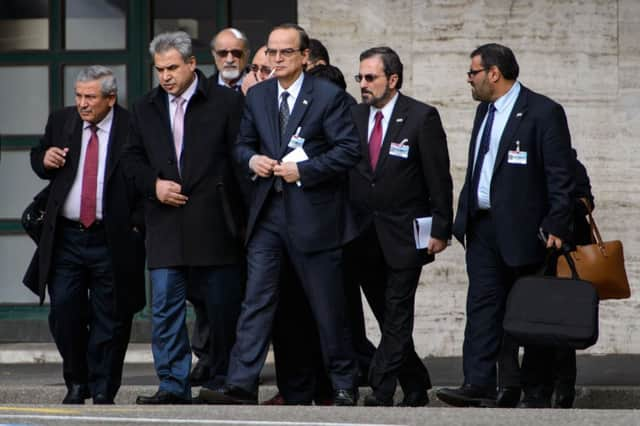Humanitarian deal reached in Syria talks


Delegates also spoke of releasing prisoners and enabling access for aid convoys during what the UN mediator acknowledged was a slow process, but one which he hoped would lead to broaching the central issue that divides them after three years of civil war – namely the future of Syria’s political structures and of President Bashar al-Assad.
Homs, occupying a strategic location at the centre of Syria’s main road network, has been a key battleground. Mr Assad’s forces retook many of the surrounding towns and villages last year, leaving rebels under siege in the centre of Homs itself, along with thousands of civilians.
Advertisement
Hide AdAdvertisement
Hide AdSyrian deputy foreign minister, Faisal Mekdad, told a news conference after yesterday’s meetings that the government would let women and children leave the city centre if rebels gave them safe passage. UN mediator Lakhdar Brahimi said he understood that they would be free to quit Homs immediately.
Mr Mekdad said: “If the armed terrorists in Homs allow women and children to leave the old city of Homs, we will allow them every access. Not only that, we will provide them with shelter, medicines and all that is needed … we are ready to allow any humanitarian aid to enter into the city through the agreements and arrangements made with the UN.”
In the city itself, however, opposition activists said rebels were demanding a complete lifting of the blockade. Some criticised negotiations in Geneva on a limited ceasefire to allow people to leave and let aid into the city. One video posted online showed demonstrators carrying Islamist flags and denouncing the Geneva talks as “treachery”.
Mr Brahimi, who presided on Saturday over the first direct meeting between the two delegations, met both together again yesterday morning, before holding discussions with each side separately in the afternoon to go over their positions.
He said he aims to hold another joint session today, when he hopes to begin discussion of a UN plan for a transitional government.
Acknowledging the slow start to proceedings which began with a formal international conference on Wednesday, Mr Brahimi said: “This is a political negotiation … Our negotiation is not the main place where humanitarian issues are discussed.
“But I think we all felt … that you cannot start a negotiation about Syria without having some discussion about the very, very bad humanitarian situation that exists.”
Mr Brahimi said opposition delegates, who want the government to release tens of thousands of detainees, had agreed to a government request to try to provide a list of those held by armed rebel groups – though many of these groups, fighting among themselves, do not recognise the negotiators’ authority.
Advertisement
Hide AdAdvertisement
Hide AdAsked about a list of 47,000 detainees submitted by the opposition, Mr Mekdad said the government had examined the list and found most had either never been held or were now free.
Western powers and Russia, respectively supportive of the opposition and of Mr Assad, have buried their differences in the hope that a negotiating process can prevent the Syrian conflict spilling further across the region.
International diplomats say the very fact of talking, and possibly making concessions on humanitarian grounds, is a start to seeking a settlement to a war neither side seems capable of winning outright. But that still seems a distant prospect.